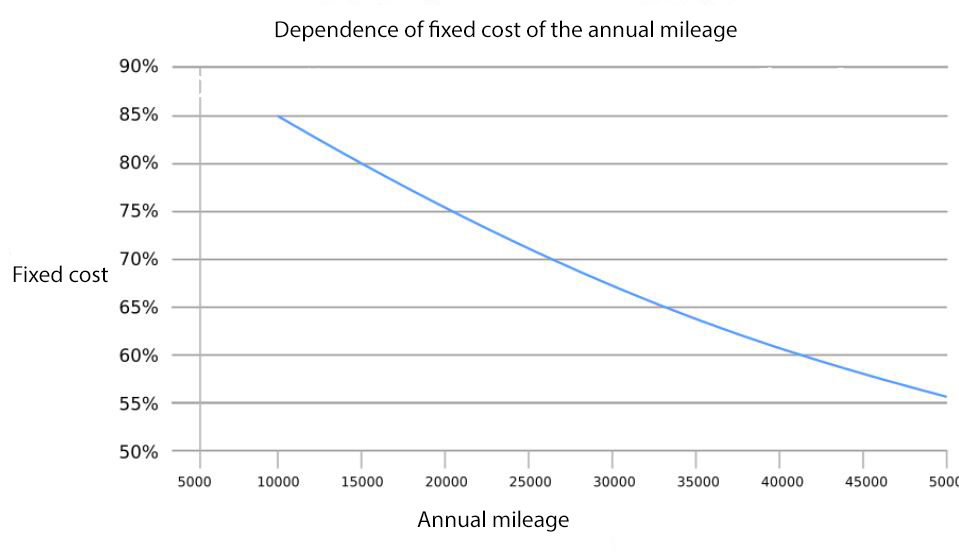Car sharing
A company car is an expense when not used and a luxury when underused
How and to what extent can the shared use of vehicles reduce your company’s costs? The less a vehicle is used, the more it’s going to cost you. Although this sounds paradoxical, the stark reality of the matter is that stationary vehicles generate no profit! A leased car which travels 10,000 km annually costs the company 6,700 euros. Of that amount, 85% constitutes fixed cost and does not depend on the mileage travelled.
How did we find these figures?
| Annual mileage (km) | 50000 | 40000 | 30000 | 20000 | 15000 | 10000 |
| Mileage-related costs | ||||||
| Petrol (6l/100km, 1.05€ / l) | 3150 | 2520 | 1890 | 1260 | 945 | 630 |
| Maintenance (300€ per visit) | 1000 | 800 | 600 | 400 | 300 | 300 |
| Tyres (400€, 50000km per set) | 400 | 320 | 240 | 160 | 120 | 80 |
| Fixed cost | ||||||
| Tyre change (40€ per one change) | 80 | 80 | 80 | 80 | 80 | 80 |
| 3-party liability insurance (11€ per month) | 132 | 132 | 132 | 132 | 132 | 132 |
| Comprehensive insurance (35€ per month) | 420 | 420 | 420 | 420 | 420 | 420 |
| Car wash (35€ per month) | 420 | 420 | 420 | 420 | 420 | 420 |
| Parking (12€ per months) | 144 | 144 | 144 | 144 | 144 | 144 |
| Fringe benefit (75€ per month) | 900 | 900 | 900 | 900 | 900 | 900 |
| Operational leasing (300€ per month) | 3600 | 3600 | 3600 | 3600 | 3600 | 3600 |
| Total annual expenditure on the vehicle | 10246 | 9336 | 8426 | 7516 | 7061 | 6706 |
| Including fixed cost | 5696 | 5696 | 5696 | 5696 | 5696 | 5696 |
| Percentage of fixed cost in total expenditure | 55.6% | 61.0% | 67.6% | 75.8% | 80.7% | 84.9% |
Less kilometres travelled implies a greater share of fixed costs in the total cost of the vehicle. A quick glance at the expense figures prompts the question: does the company really need each and every vehicle it owns? Surely everyone is interested in cutting down on expenses if this can be done without compromising the quality of the company’s products or services…
By counting the number of journeys in a day, accounting the vehicles’ moving and stationary time and considering the geography of in-motion and stationary positions, you can assess the efficiency of use of the vehicle. A good way to increase that efficiency is to share out any underused vehicles. In fact, it may turn out that the company’s every fifth or even fourth vehicle is redundant. Each eliminated vehicle means 6000+ € in savings. A significant sum, surely enough to inspire a minor effort on your part, right?
The shared use of vehicles is unthinkable without a reservation system – which is one of the standard modules of Metrotec’s GPS tracking solution.
The reservation system includes the following features:
- Overview of vehicle sharing in calendar view;
- Reservation of the vehicle for a specified user for a chosen period;
- Remote control of the vehicle’s central locking system by the user’s mobile phone during the reservation period;
- Accounting the employee’s hours worked outside the office;
- Reports and use statistics.
Additional benefits of shared use:
- Savings on the maintenance of the fleet. The maintenance of two cars with equal mileage costs more than the maintenance of a single one doing twice that mileage;
- Smaller ecological footprint, reduced total CO2 emissions;
- If a journey is planned in advance and its destination is defined in the purpose of reservation field, other users who are planning their trips at the time will be able to join in on the journey where this is possible. This will amplify the effect of shared use even more;
- The durations of journeys shorten and the service becomes more efficient;
- A vehicle that bears the company logo and is constantly on the move constitutes an effective visual advertisement.

